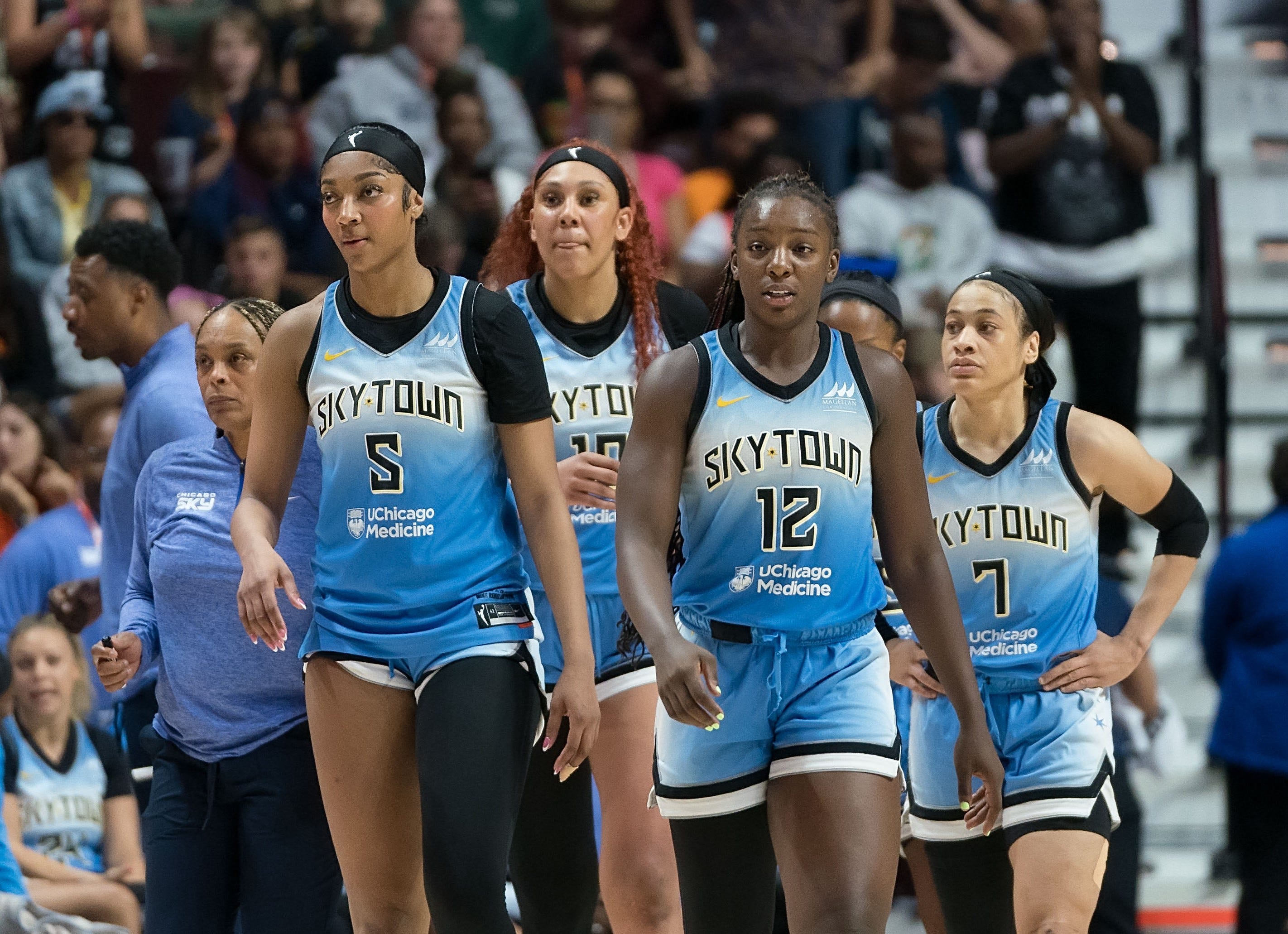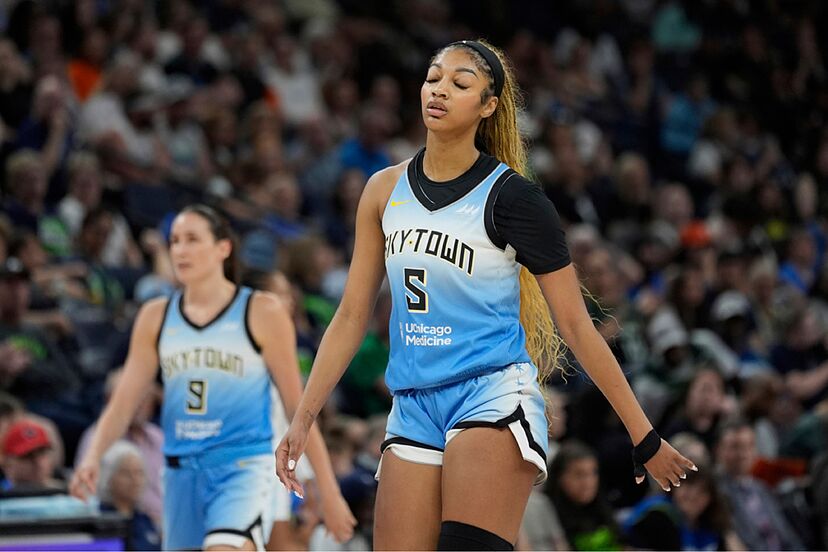In the world of professional sports, honesty can be a double-edged sword. Chicago Sky forward Angel Reese, a rising star in the WNBA, recently found herself at the center of controversy after making public statements about her team’s performance and roster. While some view her words as a bold acknowledgment of the Sky’s ongoing struggles, others perceive them as a direct attack on her teammates and the organization. This article breaks down the situation step by step, explores the reactions, shares my perspective on the issue, and discusses potential solutions for the Chicago Sky moving forward into upcoming seasons.

What Did Angel Reese Say?
Angel Reese’s comments came during an interview with the Chicago Tribune in early September 2025, amid a disappointing season for the Sky, who failed to make the playoffs for the second straight year. In the interview, Reese openly discussed the team’s shortcomings, stating that the roster “isn’t good enough” to compete at a high level and highlighting issues with coaching, player development, and overall team construction. She emphasized the need for better talent around her, suggesting that without significant changes, the organization risked continued mediocrity. Reese also reportedly doubled down on these remarks in subsequent social media activity and interviews, expressing frustration with the lack of offensive schemes tailored to her strengths and calling for a roster overhaul.
These statements were not made in isolation. The Sky’s 2025 season was plagued by inconsistencies, including a lack of offensive identity when Reese was off the floor, poor roster decisions by general manager Jeff Pagliocca, and an overall failure to build a competitive team around their young core. Reese, who has been a standout performer with her rebounding and defensive prowess, appeared to be voicing what many fans and analysts had already observed: the team simply wasn’t equipped to succeed.
However, the fallout was swift. The Chicago Sky organization responded by suspending Reese for the first half of a game, labeling her comments as “detrimental” to the team. Reese later issued an apology to her teammates, clarifying that her words were “misconstrued” and that she didn’t intend to criticize individuals but rather highlight systemic issues. Despite the apology, the incident sparked trade rumors, with Reese hinting she might seek a move if changes aren’t made.
Public Perception: Acknowledgment vs. Attack
The reaction to Reese’s statements has been polarized. On one side, supporters argue that she was simply acknowledging the obvious flaws in the Sky’s setup. Fans on platforms like X (formerly Twitter) echoed her sentiments, with posts calling the roster “trash” and criticizing the front office for failing to support Reese adequately. Analysts, including those from SB Nation, praised her for “telling no lies” about the organization’s mismanagement, pointing to poor draft picks and free-agent signings as evidence. In this view, Reese’s candor is a refreshing call for accountability in a league where players are increasingly empowered to speak out.

On the other hand, critics see her comments as an attack that undermines team unity. Phoenix Mercury guard Sophie Cunningham publicly slammed Reese for airing grievances outside the locker room, arguing that such issues should be handled internally to avoid division. Some teammates reportedly responded pointedly, emphasizing the need for loyalty and collective effort. The suspension itself fueled this narrative, with the organization signaling that public criticism crosses a line. Detractors worry that Reese’s approach could make the Sky less attractive to future free agents, portraying the team as unstable.
This divide highlights a broader tension in sports: the balance between individual expression and team harmony. Reese, known for her outspoken personality, has built a brand on authenticity, but in a team sport like basketball, words can have ripple effects.
My Thoughts on the Issue
From a neutral, truth-seeking perspective, Angel Reese’s statements strike me as more of an honest acknowledgment than a malicious attack. The Chicago Sky’s struggles are well-documented—poor roster construction, inconsistent coaching, and a lack of supporting talent around Reese have been evident to anyone following the team. Her comments align with objective assessments, and suppressing them only exposes deeper franchise issues, as noted in analyses from outlets like The New York Times.

That said, the delivery matters. Publicly calling out the roster could erode trust in the locker room, even if unintentional. Reese’s apology shows she recognizes this, but it also underscores the need for players to channel frustrations through private channels first. Ultimately, this isn’t just about Reese—it’s a symptom of organizational dysfunction. Punishing her for speaking truth risks alienating a franchise cornerstone, and the Sky’s GM has even affirmed she’ll remain on the roster “until I hear differently,” suggesting internal acknowledgment of her value.
In my view, Reese is right to demand better, but the team must respond constructively rather than reactively. This could be a turning point if handled well, fostering growth rather than division.
Potential Solutions for the Chicago Sky in Upcoming Seasons
The Chicago Sky face a crossroads, but there are clear paths to improvement. Here’s a breakdown of potential solutions, focusing on strategic, actionable steps:
| Area of Focus | Current Issue | Proposed Solution |
|---|---|---|
| Roster Construction | Lack of complementary talent around Reese; over-reliance on her rebounding without offensive support. | Prioritize the 2026 WNBA Draft to select versatile scorers and playmakers. Target free agents like proven shooters or defensive specialists to balance the lineup. Explore trades for established players, potentially packaging underperforming assets. |
| Coaching and Development | No clear identity, especially offensively; failure to run schemes for key players. | Consider a coaching change if current staff can’t adapt. Hire someone with experience in player development, like a former assistant from successful teams (e.g., Las Vegas Aces). Invest in analytics-driven training to maximize Reese’s strengths. |
| Front Office Leadership | Mismanagement in roster decisions, leading to “organizational malpractice.” | Replace GM Jeff Pagliocca with a proven executive who has a track record of building contenders. This could restore player confidence and attract talent. |
| Team Culture and Communication | Internal divisions exacerbated by public comments and suspensions. | Implement team-building initiatives and open forums for feedback. Foster a culture where concerns are addressed privately first, but transparency is valued. Retain Reese as a core piece, using her input in planning. |
| Long-Term Strategy | Repeated playoff misses; trade rumors around stars. | Commit to a rebuild timeline, aiming for contention by 2027. Leverage Reese’s marketability to boost fan engagement and revenue, funding improvements. Monitor expansion drafts for opportunities. |
Implementing these could turn the Sky around, but it requires buy-in from ownership. If not, Reese’s potential departure—perhaps to teams like the New York Liberty or Seattle Storm—could be a reality, as speculated in recent reports.
Conclusion
Angel Reese’s recent statements have ignited a necessary conversation about the Chicago Sky’s future. While they may come across as an attack to some, they ultimately serve as a wake-up call for a franchise in need of change. By addressing roster gaps, leadership issues, and cultural dynamics, the Sky can emerge stronger. Reese, with her talent and voice, could be the catalyst for that transformation—if the organization listens. As the WNBA continues to grow, stories like this remind us that progress often starts with uncomfortable truths.
Leave a Reply